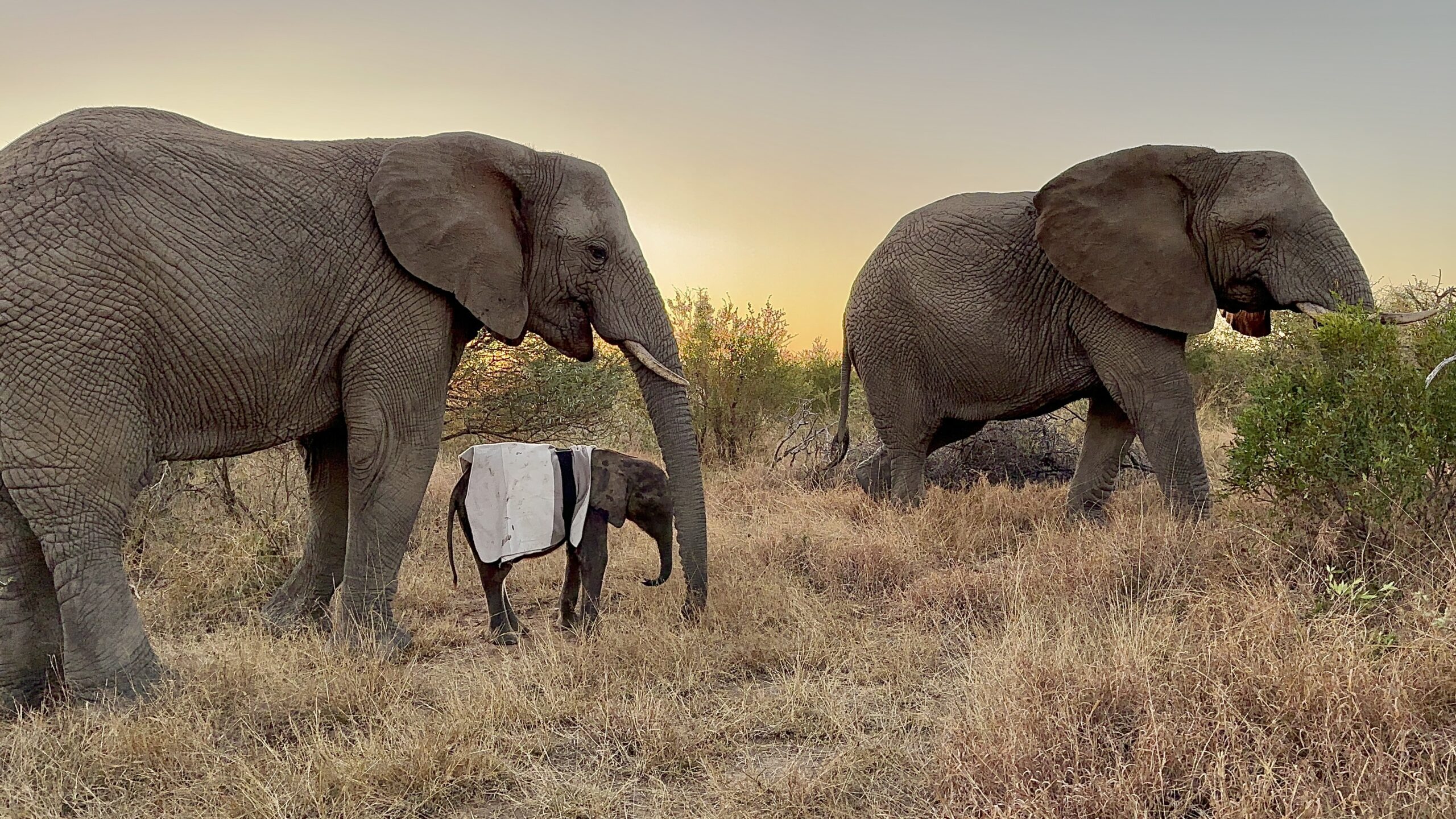A second elephant calf snare victim was brought into our care at HERD Elephant Orphanage, South Africa, on 17 February 2021.
This young female elephant calf was found on a private game reserve in Phalaborwa, in Limpopo province by local resident, Willem Botha and his son, Liam. She had a wire snare wrapped tightly around her head which had caused severe wounds, however, she had managed to dislodge the snare from where it had been secured. There was no sign of her herd, who may have abandoned her, or she may have become separated from them before becoming ensnared. Mr Botha contacted wildlife veterinarian, Gerrit Scheepers, who managed to locate the calf after a few hours and sedate her for the journey to our orphanage.
She was extremely scared and defensive from the beginning, not allowing anyone to come near her. It was evident that she had been highly traumatised.
She is estimated to be 2,5years and approximately 350 – 400 kilograms. She was in a severely degraded state due to serious wounds caused by the snare, dehydration and starvation.
The snare had torn the top right section of her ear vertically, which hindered the use of the ear and wounds behind the ear were very deep. The snare was etched deeply into the back of the neck creating a wide-open wound and underneath her head around her throat, where the notch in the snare created an open hole, revealing her bone. There was an immense maggot infestation in all of the wounds.
Judging from the condition of her wounds, it is likely she had been alone, suffering from the snare’s grip for at least four to eight weeks, according to the veterinary team who cleaned her wounds and provided her with much-needed fluids and vitamins.
We have named the new calf Fenya (Sotho for “survivor”), which was chosen by our HERD elephant carers who have been by her side 24/7 since she arrived.
The young calf has endured a similar traumatic experience to Khanyisa, an orphaned albino elephant calf who had similar injuries when she was found in January 2020. Fortunately, she is fully healed and integrating gradually with the Jabulani elephant herd.
Within a week in our care, she had made excellent progress in trusting our carers and allowing Adine Roode, HERD Founder, to clean and treat her wounds. She is now accepting milk from a bottle too, which is remarkable progress.
On her first night, she communicated with the Jabulani herd by rumbling and they replied with rumbles of their own. Khanyisa rumbled at times in the nursery next door too. The new calf slept very little at first but she did eat leaves and branches.
Her wounds and her weight are our biggest concerns now. Wildlife veterinarian Dr. Peter Rogers returned to clean the wounds and assess them for stitching. They administered extra vitamins through a drip. Her blood results show she has a low red blood cell count and her albumen levels are low.
Dr. Rogers advised that the Fenya needs to get stronger before further treatments are made that involve further sedation, which would include a blood transfusion from one of the older elephants in the Jabulani Herd, which will assist with her low albumen levels.
Given the extreme trauma that she experienced, both emotionally and physically, her rehabilitation may take some time, much like Khanyisa’s rehabilitation in 2020. Our team are ready and prepared. This brave elephant mostly definitely willed herself through a very dark time out in the reserve, all by herself. We have spent the first two weeks trying to slowly gain Fenya’s trust, so to be able to get closer to her and help her on her journey.
How she survived is beyond comprehension. The trauma both physically and emotionally fora young calf is unbearable to think of. It is no wonder she does not trust easily and is very defensive toward anyone around her.
Fortunately, the young calf could survive on vegetation, though her body would definitely be in need of milk to assist with healthy development. Her appetite was good and continued to get better – we supplied her with fresh water, leaves and branches. But it would be a challenge to get her to drink milk. Milk was not urgent but we had to find a way to get her to gain weight and get back to health.
Adine and the team tried different ways to get her to take grass and water from us, for instance through a hole in the door, while hiding behind it. And then, miraculously, she eventually let Adine touch her for the first time. And soon the carers could too, with Joshua and Liverson being the main carers on duty with her and Khanyisa.
Within a couple of days, the new elephant orphan had already started sleeping lying down in her nursery, too, which meant that she was feeling safer with us, no longer having to be on constant alert. For the first two days at the orphanage, she slept standing up during the day, and has gradually started lying down, first at night, and now several times during the day too.
Every day has been a journey of love, patience and challenges. Day 6 was a tremendous milestone too, with Fenya starting to take the milk bottle from Liverson first, and then Adine and Khensani. She finishes all her milk now and has a never-ending appetite, moving onto fruit in her food basket, topping up on water but still opting out when it comes to pellets.
Our HERD Care team has been immersed in caring for her and seen such incredible progress in a short space of time. With constant perseverance from Adine and the carers, Fenya has started to allow them to touch and rub her and Adine can now (slowly) hold her even inside the calf’s nursery. Previously this would have been met with a head butt or charge. With baby elephants being such emotional, sensitive and herd animals, providing a mother’s touch, support and company is vital for Fenya’s wellbeing.
Many people have asked when she will meet the herd. That will only happen when she is fully healed and when we can walk with her safely.
Through her short journey of healing so far, she has been nothing short of an incredibly strong survivor, and that is what our carers chose to call her, in a local South African language of Sotho: Fenya. Meaning Survivor.
We will be sure to keep sharing updates of her rehabilitation at HERD with you. Thank you for the amazing support, love and messages!
To Donate: https://herd.org.za/donate/
For daily updates on FENYA’s progress follow our social media platforms: Facebook | Instagram | Twitter | Youtube
www.herd.org.za




 Comment
Comment






